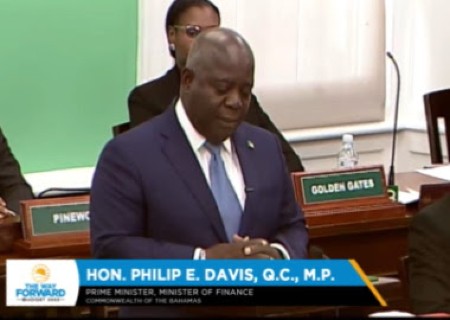NASSAU, Bahamas – The Bahamas government says it has successfully lowered the debt-to-GDP (gross domestic product) ratio from over 100 percent” premising to further reduce the debt to 65 percent by the 2026/2027 fiscal year.
 Prime Minister Phillip Davis in Parliament“We expect to see increased revenues and disciplined expenditures as we work toward our goal of a 25 percent revenue-to-GDP ratio, fueled primarily by increased efficiency and fairness in tax collection and a booming economy,” Prime Minister Phillip Davis said as he winded up debate on the mid-year budget debate in Parliament on Monday.
Prime Minister Phillip Davis in Parliament“We expect to see increased revenues and disciplined expenditures as we work toward our goal of a 25 percent revenue-to-GDP ratio, fueled primarily by increased efficiency and fairness in tax collection and a booming economy,” Prime Minister Phillip Davis said as he winded up debate on the mid-year budget debate in Parliament on Monday.
“Already, we are seeing the fruits of our strategic approach to fiscal management come to bear, as we have successfully lowered the debt-to-GDP ratio from over 100 percent under the previous administration to just over 80 percent.
“We expect continued decreases, as we seek to take it all the way down to 65 percent by the 2026/2027 fiscal year. The country’s fiscal performance is finally improving, after years of missed targets and broken promises,” said Davis, who is also the Finance Minister.
He told legislators that the budget for the 2023/2024 fiscal year will be presented to Parliament in less than two months.
“On the 31st of May 2023, I will return to this House to present the 2023/2024 budget. It will be the country’s Jubilee budget, and will feature important and innovative policies that will lay the foundation for our next 50 years as a nation.
“This will be just our second full fiscal cycle to deliver on our promise of a new day for the Bahamian people and fulfil our mandate as the duly elected government of The Bahamas.
“In that budget, as always, we will put the Bahamian people first, focusing on creating widespread and diverse opportunities at all levels, while creating a more equitable society and providing more support for those who need it the most,” he said.
In his presentation, Prime Minister Davis said the former government had been unable to meet its budget projections during its four-and-a-half year term.
“If this current mid-year budget before us didn’t already happen, such that the numbers represent incontrovertible fact, they would be saying that the six month out-turn, which has been presented, is too optimistic. Our optimism seems to be at the heart of their argument,” he said.
Prime Minister Davis said that when the last administration increased the value added tax (VAT) by 60 percent, it didn’t meet their own revenue projections .
“So they are struggling to comprehend how we lowered VAT and lowered or eliminated customs duties on dozens of food items and essential goods, and not only met our revenue projections, but still be on track to have the highest recorded revenue as a percentage of GDP in the last ten years,” Davis said.
“Do you know that during their four years in office, year after year they failed to meet their budget projections? Year after year, the deficit grew to alarming levels,” Davis said, adding “they were forced to an early election, with a clear understanding that if by some slight chance they won, they had to increase taxes, including increasing VAT to 15 percent.
“Now they’re gonna say that ain’t so, but there are only two possibilities. Either they had no plan to rescue the country from fiscal crisis, or they did have a plan – but were so sure it would lose them support that they kept it hidden before Bahamians voted,” Davis said.


